Redditor Disposes Of A Dead Cat He Thought Was A Stray, Gets Berated For It
Losing a cat can change your life, and it can be just as devastating as losing a human companion. Whether the loss is unexpected or long anticipated, the pain that comes with it can be excruciating.
Even when we know that our cat's life will end, how we react can still have a significant impact. Our kitties are our constant friends and part of our everyday lives.
We enjoy their wittiness, feel their love, and share life events with them. It should come as no surprise that when they pass away, we frequently experience a sizable void that may affect our daily lives.
Yes, grieving is a normal and healthy reaction to loss. There is no one way that is "right" to mourn the loss of your cat.
But what about finding a dead cat on your porch? A cat you are not close to in any way chooses your porch to die on.
That is the story we see in today’s post as a Redditor named u/agentfortyfour shared with the AITA subreddit community. The man chose to dispose of this dead feral kitten, whom he thought was a stray, for several reasons.
He then posted about it on a Facebook page, only for the "cat owner" to show up and demand the dead cat. Read the full story as you keep scrolling below.
OP says:

We have seen this cat around for a couple of years.
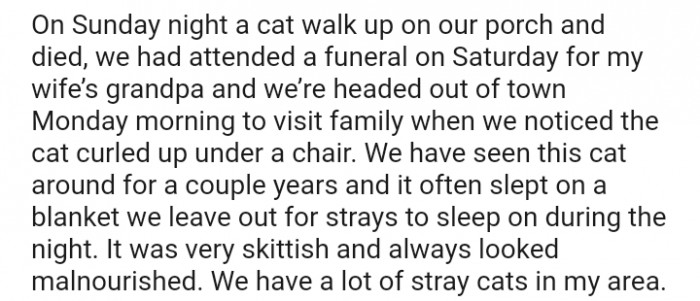
I didn't want another animal digging it up.
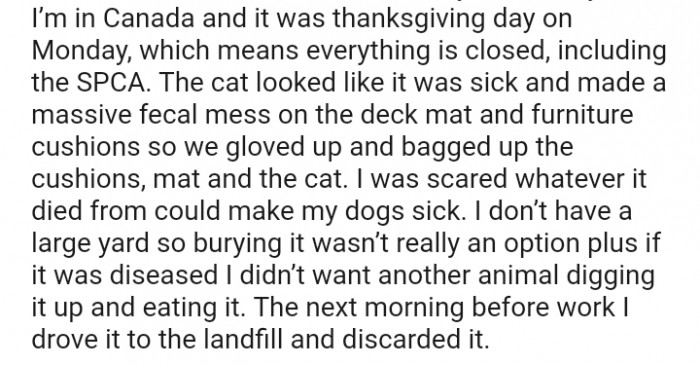
The Emotional Weight of Animal Care Decisions
The decision to dispose of a deceased pet, especially under the assumption that it was a stray, carries significant emotional weight. Dr. Timothy L. Jones, a psychologist specializing in grief and loss at Emory University, notes that pet owners often experience profound grief, even if the pet was not their own.
Research indicates that the bond between humans and animals can evoke strong emotional reactions, highlighting the psychological impact of loss and the responsibilities that come with caring for animals.
The Emotional Weight of Animal Care
This scenario underscores the complex emotions tied to animal care, particularly regarding loss and responsibility. Research in animal-human relationships suggests that individuals often develop profound emotional bonds with pets, leading to feelings of guilt and sadness in situations involving harm or death. The Redditor's distress over disposing of the dead cat reflects a deep-seated empathy for animals and the responsibility that comes with caregiving. According to studies published in the Journal of Applied Animal Welfare Science, these emotional connections can significantly impact individuals' mental health.
Recognizing the emotional weight of such situations can help individuals process their feelings more effectively.
She yelled at my wife and then berated me.
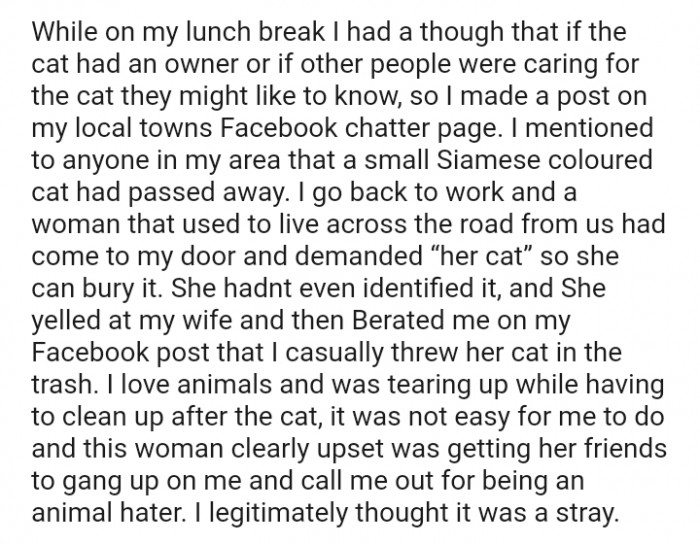
Here are a few things to note.

It didn't look like he was caring for them.
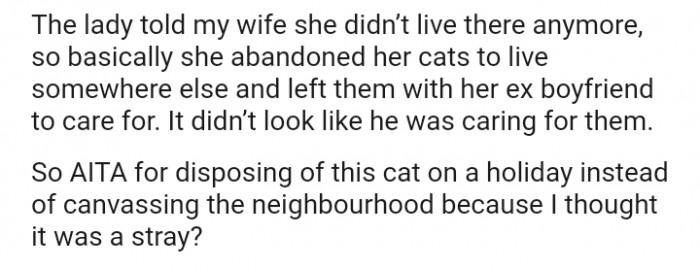
In this case, the assumption that the cat was a stray may have influenced the individual's decision-making process. Studies show that cognitive biases can lead individuals to minimize the emotional significance of a situation based on their perceptions. This underscores the importance of empathy and understanding when it comes to dealing with the loss of animals, whether owned or not.
Recognizing the emotional responses of others can foster a more compassionate approach to such situations.
From a psychological perspective, the concept of grief is crucial in understanding this scenario. The loss of a pet can evoke similar feelings to losing a loved one, as outlined in research by Dr. Julie Axelrod, who emphasizes that pet loss can trigger profound grief responses. The Redditor's tears while cleaning up after the cat demonstrate the emotional turmoil often associated with such experiences. Understanding the stages of grief can help individuals navigate their feelings and find healthier coping mechanisms.
To summarize the whole story...

Here are a bunch of comments from Redditors in response to the post.
Cat owner is being unreasonable.
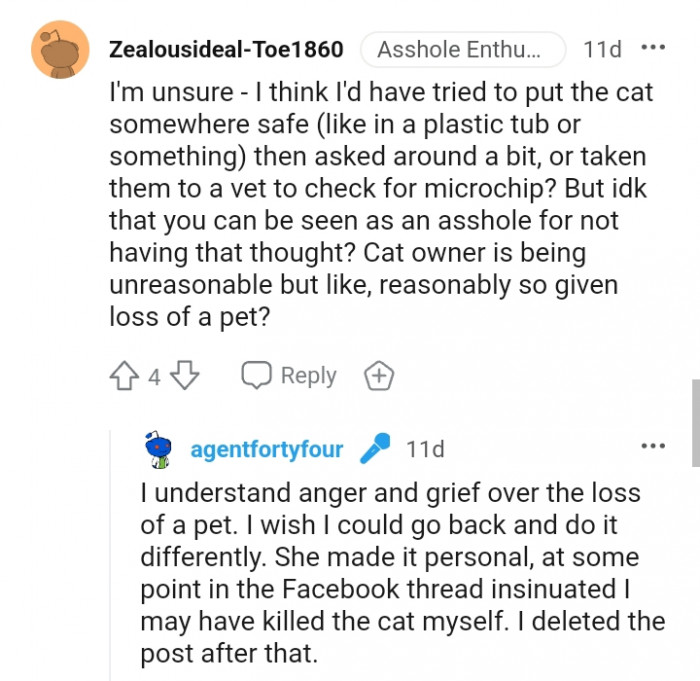
There's really not much else you could have done.
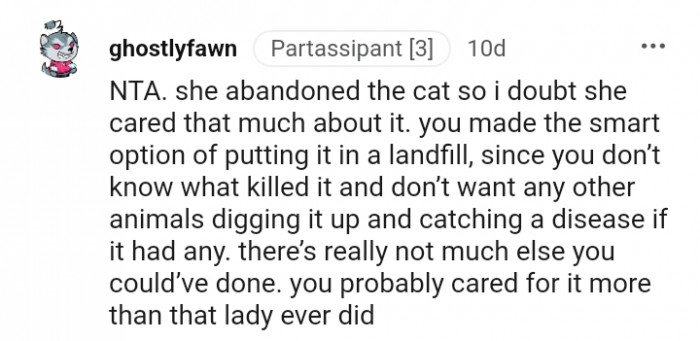
Supporting Emotional Needs in Animal Loss
To navigate the emotional complexities surrounding animal loss, it is essential to approach the situation with sensitivity. Dr. Elizabeth Kübler-Ross's stages of grief provide a useful framework for understanding how individuals process loss. By recognizing that grief can manifest in various forms, individuals can better support one another during difficult times.
Encouraging open discussions about feelings surrounding pet loss can create a supportive environment for those affected, allowing for healing and emotional processing.
The Role of Empathy in Animal Care
Empathy plays a vital role in how individuals respond to animal welfare situations. A clinical psychologist notes that fostering empathy can significantly enhance one’s emotional resilience when dealing with loss. Research indicates that individuals who cultivate empathy towards animals often exhibit greater emotional intelligence and resilience in their personal lives. In this case, the Redditor’s emotional response can be viewed as a reflection of their strong empathetic disposition, which is a beneficial trait in navigating life's challenges.
Encouraging empathy can lead to a deeper understanding of the emotional complexities involved in animal care.
They cannot consider themselves a pet owner if...
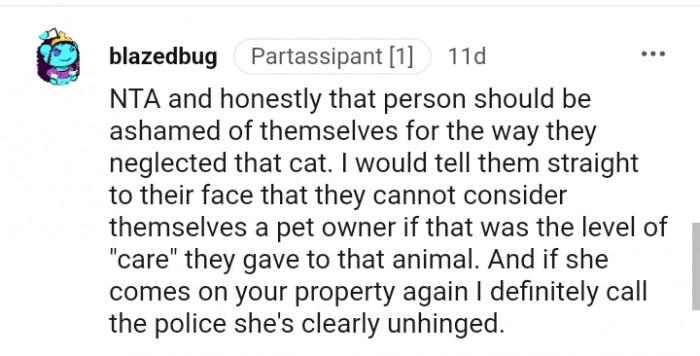
You can't undo anything that was done.
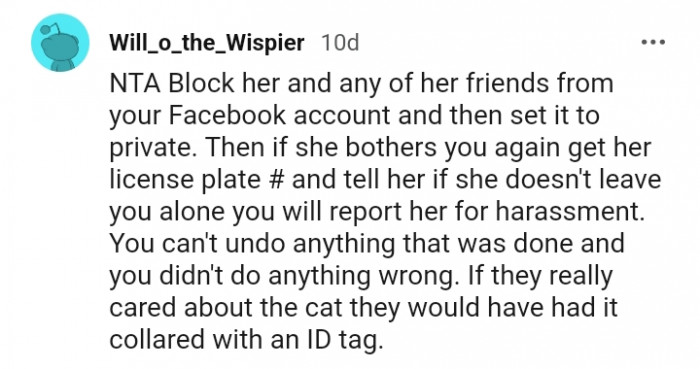
It's not like the cat was well taken care of.
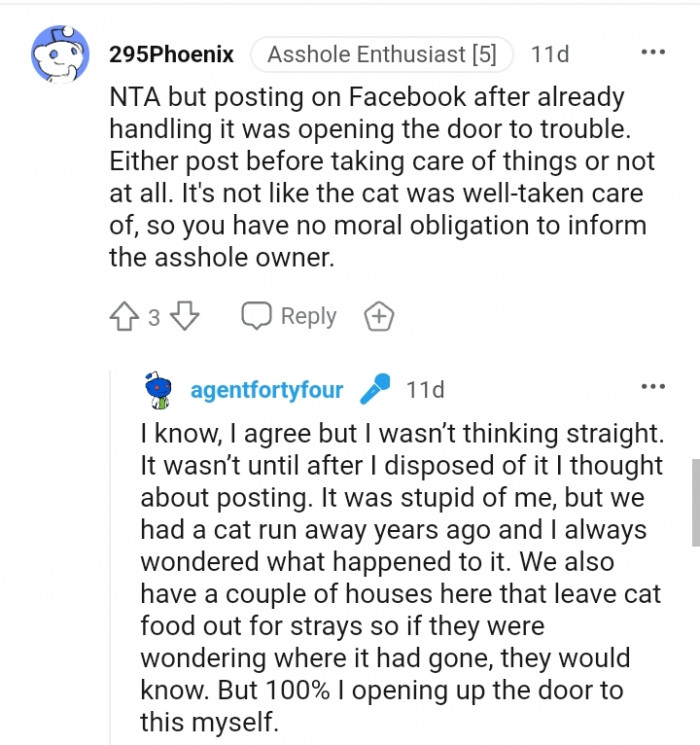
Additionally, providing resources for grief support can be beneficial. Research shows that support groups and counseling can significantly aid individuals coping with the loss of a pet. Establishing community resources for pet loss can foster a sense of connection and understanding among those navigating similar experiences.
By creating spaces for shared experiences, individuals can find solace and validation in their feelings, ultimately promoting emotional healing.
Moreover, it’s essential to address the practical aspects of pet loss and care. Studies suggest that having a support system in place can significantly alleviate the emotional burden associated with loss. The Redditor might benefit from discussing their feelings with friends or family who understand the emotional weight of losing a pet. Research from the American Psychological Association emphasizes that open conversations about grief can promote healing and foster emotional support.
No good deed goes unpunished.

Who wants to keep a dead animal around?
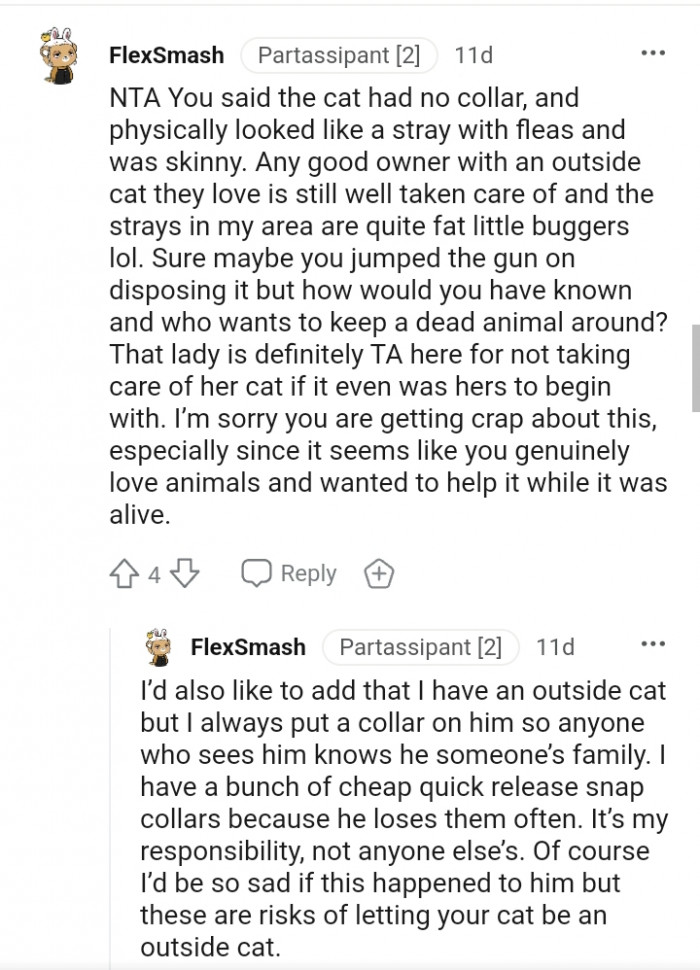
The OP hopes the cat died comfortably and peacefully.
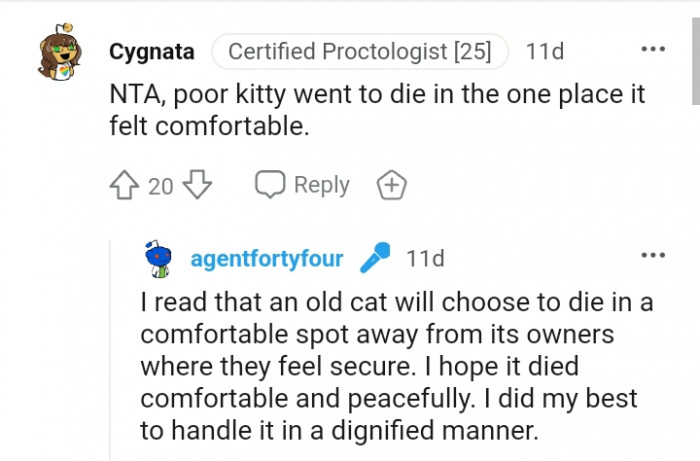
Practical Strategies for Coping with Pet Loss
To cope with the emotional fallout of pet loss, individuals can benefit from engaging in rituals that honor the animal's memory. Creating a memorial or participating in a remembrance ceremony can provide a sense of closure and facilitate healing. Research shows that such rituals can promote psychological well-being by allowing individuals to express their grief in a healthy manner. Additionally, seeking professional help from therapists who specialize in pet loss can provide valuable support and coping strategies.
Ultimately, these strategies can help individuals process their feelings and move towards healing.
The fact is that she's a terrible pet owner.
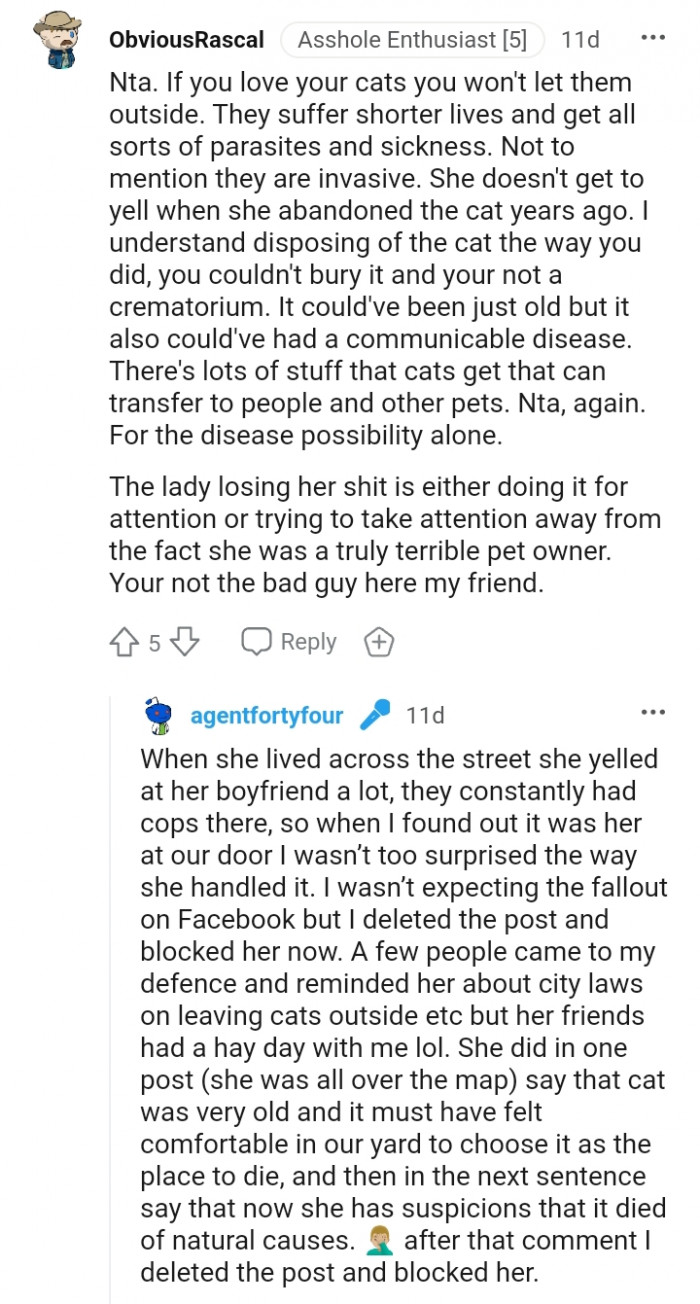
It was reasonable to assume it was a stray.
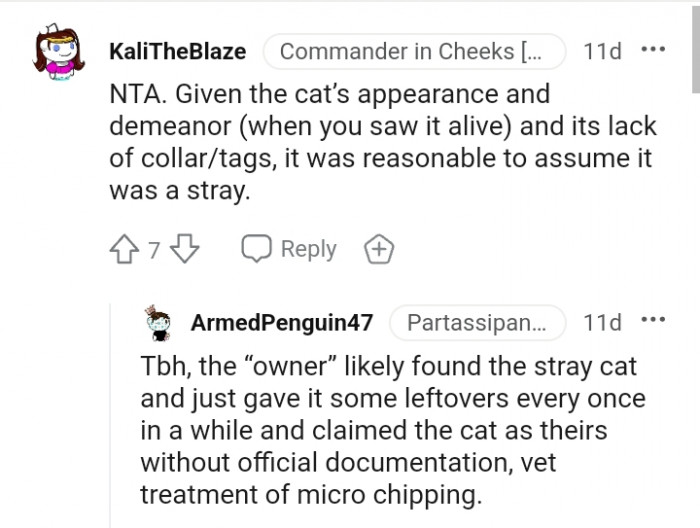
She has no business accusing you.

Tell her you'll report her to animal cruelty.

You should have done it when you found the cat.
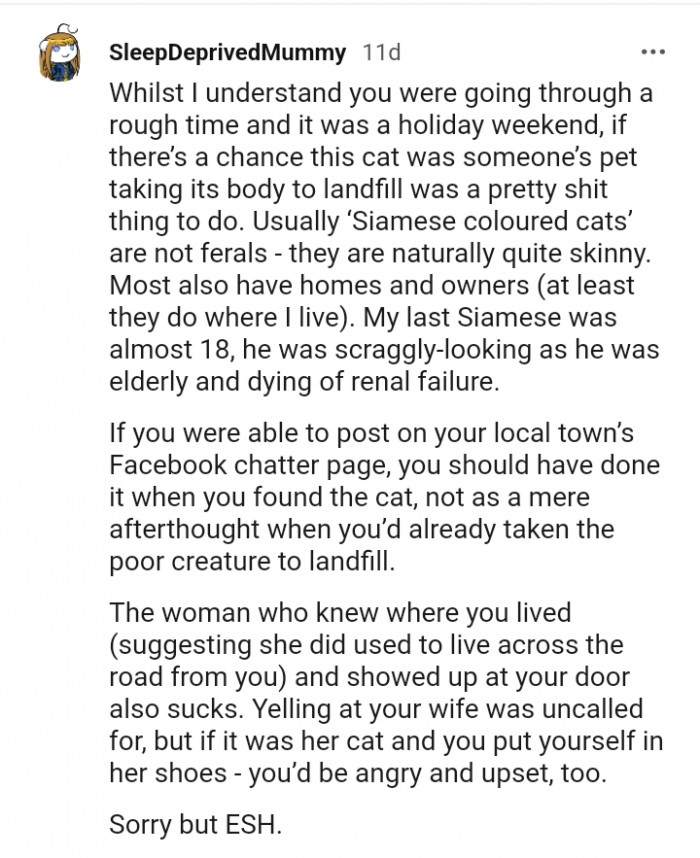
The OP wishes he had thought it through a little better.
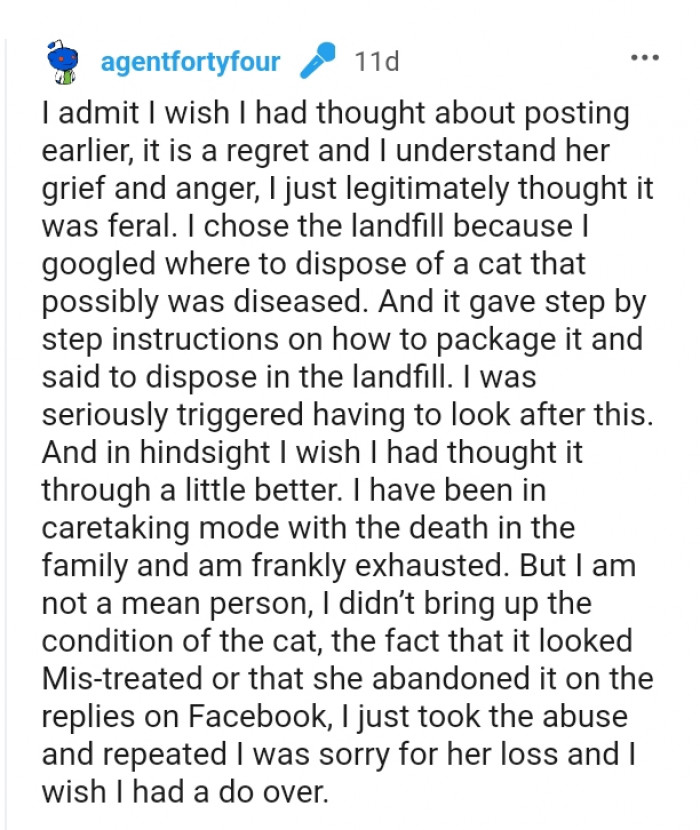
For this Redditor, the OP is not the AH.
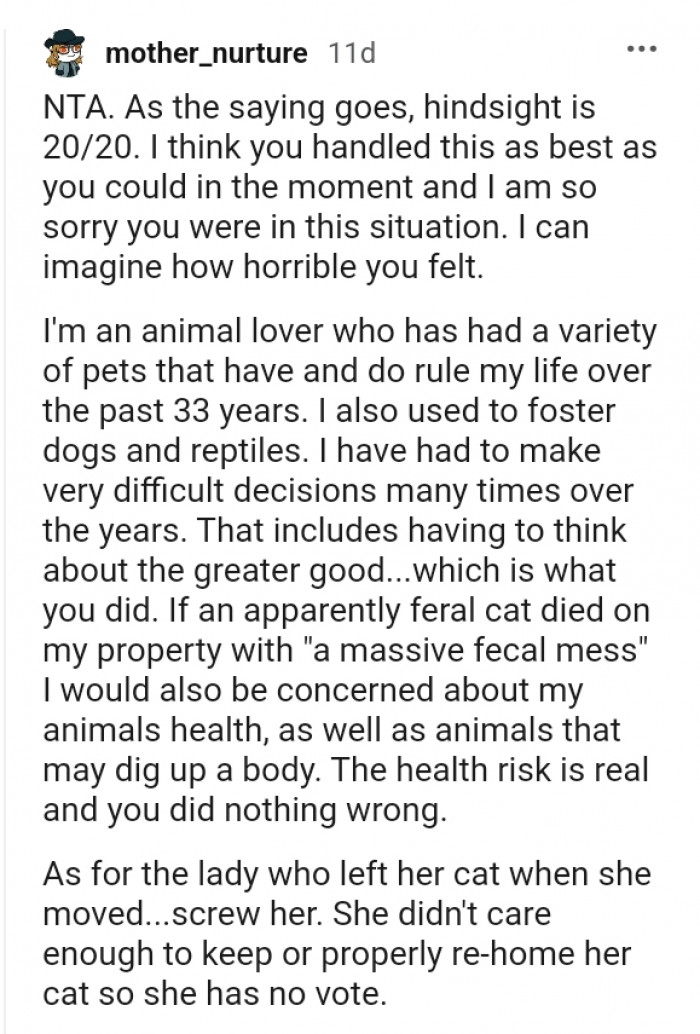
Grief does not follow a "normal" timeline, as "it takes as long as it takes." Every loss experience is different and can elicit a range of feelings.
This is typical, whether you’re experiencing feelings of sadness, anxiety, fatigue, guilt, or relief. Although it may be comforting to hear that others have gone through a similar experience, each person who has loved and lost a cat will go through the grieving process in their own way.
Psychological Analysis
This situation highlights the deep emotional connections individuals form with their pets. The Redditor's distress reflects a common human experience of grief and responsibility towards animals. Encouraging open conversations about these feelings can help individuals process their emotions and foster healing.
Analysis generated by AI
Analysis & Alternative Approaches
In summary, the emotional complexity surrounding pet care and loss is profound and can significantly impact individuals' mental health. By fostering empathy and addressing grief, individuals can navigate these experiences more effectively. Research supports the importance of support systems and healthy coping strategies in managing the emotional challenges associated with pet loss.
Analysis & Alternative Approaches
In summary, the emotional weight of animal care decisions emphasizes the need for empathy and understanding in community interactions. Recognizing that loss affects individuals differently can foster a more compassionate approach to situations involving pets.
According to studies in grief psychology, supporting one another through loss can significantly enhance emotional resilience and promote healing within communities.



